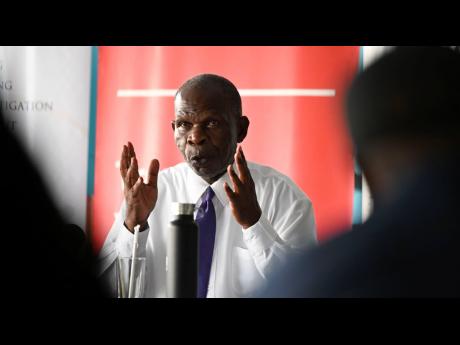Issues
JAMAICA'S FUTURE DRIVEN BY AUDACIOUS GOALS AND VISIONARY PLANS

No matter where you go in Kingston, the Jamaican capital, it seems no one really cares about King Charles's coronation.
The fact that he is even King of a country where hundreds of thousands were enslaved under centuries of British rule is viewed as an insult of history to many.
"Why is the King still our head of state?" asked Jahmar Clarke, 32, over a game of dominoes with friends at a Kingston bar.
"We should move past the monarchy … it's time for us to address it as a nation."
That's exactly what Jamaica is trying to do. The government says it will hold a nationwide referendum with the goal of removing King Charles as head of state by 2025.

The growing importance of energy efficiency in Jamaica cannot be overstated, as the island nation faces mounting challenges in meeting its energy needs while simultaneously striving to reduce its carbon footprint. With a population of approximately 2.9 million people and a heavy reliance on imported fossil fuels, Jamaica has long been grappling with high energy costs, unreliable power supply, and environmental concerns. In recent years, however, the country has been making significant strides in embracing renewable energy solutions, driven by a combination of government initiatives, private sector investments, and increasing public awareness.
One of the key factors propelling the shift towards renewable energy in Jamaica is the recognition that the country’s heavy reliance on imported fossil fuels is unsustainable. According to the World Bank, Jamaica imports over 90% of its energy needs, making it highly vulnerable to fluctuations in global oil prices. This has led to high electricity costs for both residential and commercial consumers, with the average electricity tariff in Jamaica being among the highest in the Caribbean region. The need to reduce this dependence on imported fuels and diversify the country’s energy mix has become a national priority, with the government setting a target of generating 50% of the country’s electricity from renewable sources by 2030.
Another driving force behind the rising demand for renewable energy solutions in Jamaica is the growing awareness of the environmental impacts of fossil fuel consumption. As a small island developing state, Jamaica is particularly vulnerable to the effects of climate change, including rising sea levels, more frequent and severe storms, and disruptions to ecosystems and agriculture. The government has acknowledged the need to reduce greenhouse gas emissions and has committed to a 25% reduction by 2030 under the Paris Agreement. This has led to a greater emphasis on promoting clean energy technologies, such as solar, wind, and hydroelectric power, as well as energy efficiency measures.
The private sector has also played a crucial role in advancing renewable energy adoption in Jamaica. Many businesses have recognized the potential cost savings and environmental benefits of investing in clean energy solutions and have taken steps to implement them. For example, the Jamaica Public Service Company (JPS), the country’s primary electricity provider, has been investing in renewable energy projects, including the construction of a 36.3-megawatt wind farm and a 24.5-megawatt solar facility. Additionally, several hotels and resorts have installed solar panels and other energy-efficient technologies to reduce their energy consumption and operating costs.
The Jamaican government has also been proactive in creating an enabling environment for renewable energy development. In recent years, it has implemented a range of policies and initiatives aimed at promoting clean energy adoption, including the establishment of a net billing program, which allows consumers who generate their own electricity from renewable sources to sell excess power back to the grid. The government has also provided incentives for the private sector to invest in renewable energy projects, such as tax breaks and low-interest loans.
Public awareness and education campaigns have further contributed to the growing demand for renewable energy solutions in Jamaica. Organizations such as the Petroleum Corporation of Jamaica (PCJ) and the Jamaica Sustainable Energy Council (JSEC) have been working to raise awareness about the benefits of clean energy and energy efficiency measures, through workshops, seminars, and public outreach programs. These efforts have helped to create a more informed and engaged citizenry, which is increasingly demanding cleaner and more sustainable energy options.
In conclusion, the growing importance of energy efficiency in Jamaica is evident in the rising demand for renewable energy solutions, driven by a combination of government initiatives, private sector investments, and public awareness. As the country continues to work towards reducing its dependence on imported fossil fuels and embracing cleaner, more sustainable energy sources, it is clear that energy efficiency will remain a critical component of Jamaica’s energy future.

Kingston, Jamaica. June 03, 2024: Opposition Spokesperson on Water, Ian Hayles, has voiced serious concerns regarding the government's recent announcement on the measures to address the ongoing water crisis in Negril. While the allocation of $25 million for water trucking and the distribution of 2,000 water storage tanks are positive steps, several critical issues remain unresolved.
Mr. Hayles questions whether the government's compensation plans extend to the residents of Negril, who have been significantly affected by the water shortage. "The residents of Negril have faced severe hardships due to the ongoing drought. They have had to endure not only the inconvenience of water shortages but also the financial burden of purchasing trucked water. It is imperative that the government clarifies whether these residents will receive any form of compensation or relief," he stated.
The lack of a clear plan for compensation for residents raises concerns about the equity and fairness of the government's response. Many residents have reported being out of water for extended periods, impacting their daily lives and overall well-being. Mr. Hayles urges the government to consider the broader social and economic implications of the water crisis on the local population.
Another pressing issue highlighted by Mr. Hayles is the potential disparity in compensation between local and multinational businesses. "While the government's measures to support the tourism sector are necessary, there needs to be transparency in how compensation is allocated. Will local businesses receive the same level of support as multinational corporations? Many small and medium-sized enterprises (SMEs) in Negril are struggling to stay afloat due to the additional costs incurred from the water crisis," he emphasised.
The Opposition Spokesperson is calling for a comprehensive compensation strategy that ensures fairness and equality. Local businesses, which are the backbone of Negril's economy, should not be overlooked in favour of larger multinational entities. The government must provide a clear and detailed plan on how it intends to support all affected businesses equitably.
Mr. Hayles further urges the government to take immediate and decisive action to address these concerns. "The people of Negril deserve answers and concrete solutions. We need to ensure that both residents and businesses, regardless of their size, are adequately supported during this challenging time. The government's response must be inclusive and just," he concluded.

KINGSTON, Jamaica — The scent of coconut oil and fiery jerk spice blows through kitchens across this green island, but as the country’s food imports have become a billion-dollar threat to finances and health, Jamaica has taken on a bold new strategy: make farming patriotic and ubiquitous, behind homes, hospitals, schools, even prisons.
Across the Caribbean, food imports have become a budget-busting problem, prompting one of the world’s most fertile regions to reclaim its agricultural past. But instead of turning to big agribusinesses, officials are recruiting everyone they can to combat the cost of imports, which have roughly doubled in price over the past decade. In Jamaica, Haiti, the Bahamas and elsewhere, local farm-to-table production is not a restaurant sales pitch; it is a government motto.
“We’re in a food crisis,” said Hilson Baptiste, the agriculture minister of Antigua and Barbuda. “Every country is concerned about it. How can we produce our own? How can we feed our own?”
In a region where farming is still often seen as a reminder of plantations and slavery, the challenge runs deep, yet at regional meetings for years, Caribbean officials have emphasized that “food security,” primarily availability and access, is a top priority. Many countries are now responding, branding foreign food like meats and high-calorie snacks a threat, and locally grown food responsible and smart.

Trouble is brewing in the country’s transport sector following a decision by the Island Traffic Authority to suspend the driver’s licences of some public transport operators who have accumulated 10 demerit points as a result of traffic violations.
The suspension of the licences has not gone down well with several public transport provider groups, which have reportedly threatened to withdraw their services starting as early as this morning and extending into tomorrow and Wednesday, which could result in disruptions to the public transport system in some sections of the island.
The action being contemplated by some transport operator takes place amid plans by Minister of Transport Daryl Vaz to ban the operations of competing ride-share entities over safety concerns in wake of the recent disappearance of primary schoolteacher Danielle Anglin.
A body believed to be that of Anglin was found last week, just under a month after she went missing on May 13 while on her way to school from her Hellshire, St Catherine home. She had reportedly chartered transport through a ride-sharing app.
Yesterday, however, Egerton Newman, president of Transport Operators Development Sustainable Services (TODSS), told The Gleaner that no strike action would be taken as, according to him, a majority of the operators offering commuting service to the public are not in favour of any protest action at this time.
Newman said transport operators have met with Vaz and that the issues around the suspension of the driver’s licences have been discussed and will be addressed following further consultations.
‘No real cause for concern’
“From a TODSS prospective, there will be no strike action tomorrow (Monday). The minister has just sent out a voice note and we are circulating that voice note,” he said
The group that wants to have the strike tomorrow (Monday) was just engaged in a press conference and they want to postpone it. From where we sit, 85 per cent of the island public transport operators will be working tomorrow. I don’t see no challenge and I don’t see no problem about any strike. But, in case a few guys want to strike, it won’t affect the movement of people tomorrow. So there is no real cause for concern.
“The four major transport groups in Jamaica have denounced the issue of a strike for tomorrow, so I don’t think there is a problem. TODSS, JATOO (Jamaica Association of Transport Owners and Operations), NCOTA (National Council of Taxi Associations), and NATO (National Association of Transport Operators) have all denounced the issue of a strike.”
In the meantime, Vaz said he was fully aware of what he referred to as the misinformation and mischief that is circulating among transport groups as it relates to a five-day all island shutdown of the transport sector.
“The matter of demerit points is under review and we are dealing with that. I have been in touch with the transport operators. There has been a statement issued by the ITA (Island Traffic Authority) to indicate that the matters in relation to demerit points are under review by the committee,” the minister said. “There is a meeting scheduled for this week, so any action will be premature and I am calling on good sense to prevail. The matter has come to my attention and I am dealing with it appropriately and it will be part of the review of the Road Traffic Act, which is to be concluded by the end of June.”
